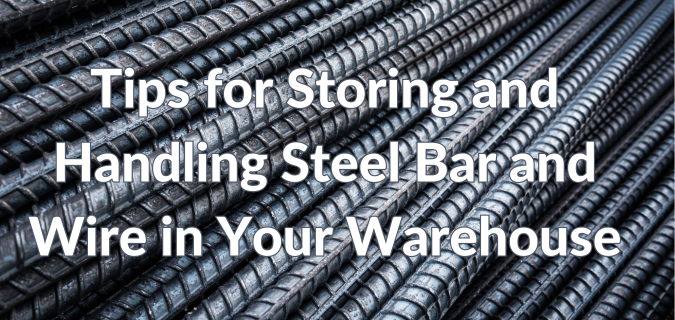
The safe storage of steel bars and wire is essential in any warehouse for the most obvious reason—the safety of those working in the warehouse—but also for the efficiency of your company’s operations. When steel is stored safely and properly, it’s easier to track inventory and access the steel when you need it, keeping your business running smoothly.
Improper storage and handling could lead to confusion and downtime in the warehouse, violation of government regulations, or, worse, injuries to your employees. When planning your warehouse storage solutions, it’s vital to work with experts who have years of experience manufacturing, distributing, and storing steel.
Safety Measures for Warehouse Steel Storage
You may be wondering why there are government regulations on warehouse storage, but the answer is simple: warehouse racking systems are considered a building-like element and thus are subject to building-like regulations designed to ensure safe storage. These regulations can come from one or more municipalities, be it city, state, or federal, and generally deal with weight limits, load distribution, and environmental concerns. Seismic regulations are particularly important, especially in certain areas of the world, which is another reason to have a trusted expert help design your storage system based on where you’re located.
Steel needs to be stored properly in order to prevent corrosion, be easy to access and retrieve, and, of course, for safety. Stacking, pallets, and shelving keep steel readily accessible and maximize warehouse space. Clean organization and proper labeling make inventory simple and warehouse operations efficient.
Types of storage systems include racks and pallets, which are often used in conjunction with warehouses. Using the right systems for your warehouse and your business requirements ensures safety and enhances the efficiency of your entire operation.
Equally, if not more important, are employee training and awareness. While racks for warehouse storage are designed for safety and durability, the knowledge and experience of your staff is paramount. Appropriate training for all warehouse employees on how to load, unload, store, and move about the warehouse is the best way to maximize safety. Training on how to spot potential issues in the maintenance of the racking system can also help keep your business moving at top efficiency.
Warehouse Racking
Steel can be stored in several types of racking systems depending on the form of the steel and the needs of your business. For steel bars, cantilever racking is often a good solution in that you’re able to maximize space with narrow aisles with no obstacles, making jobs easy for side-loading forklifts. With the ability to design a system as high or wide as is safe in your facility, cantilever racking is ideal for long steel bars such as MBQ steel, hot-rolled bars & billet, and heat-treated bars.
Pallet racks make the storage of heavy items like cold drawn wire safe and efficient while also being easy to access by side-loading forklifts. Depending on the type and size of steel—as well as for how long you’ll be storing it—you may benefit most from pallet racks, cantilever racks, or a combination of both.
Another option to consider is stanchion racks, which are a durable solution that stores items vertically, which can help with the organization and inventory of your materials while also taking advantage of your floor space.
All types of warehouse racking are intended to increase your efficiency and protect your employees and materials, so consulting with experts like Capital Steel is crucial to help determine the best solution for exactly what you need in and from your warehouse while exceeding warehouse racking safety standards.
Pallet Supports
Pallet supports are perfectly named in that they support pallets. These bars prevent beam spreading from the pallet racking system itself as well as support the heavy loads stored on the pallets.
In steel storage, metal pallets are generally preferred over wood pallets, which can potentially spread dirt throughout the facility. Also, wood can hold moisture, which could encourage steel corrosion.
Maintenance and Upkeep
As you know better than anyone, you’re storing heavy materials. While all warehouse racking systems are built for durability and are capable of storing extremely heavy materials for long periods of time, it’s important to keep up regular maintenance to ensure your system is at its safest and best.
Preferably, maintenance involves checking every element of your racking system annually or biannually. Everyday use of the racks and pallets naturally leads to wear, and frequent loading and unloading with forklifts could potentially lead to damage.
Checking the racking columns and braces, cross beams, and decking is essential, as are looking at all accessories, including connectors. When you keep up with the maintenance of your racking system, you maintain all regulatory standards, have peace of mind your people are safe, and even save money if you do need to make a simple repair during a maintenance check rather than face massive issues later.
Storing Steel to Prevent Corrosion
The biggest problem with corrosion is safety. When steel corrodes, it gets weaker, making it unsafe to use in any structure, which means you need to get rid of it, making it detrimental to your overall efficiency and bottom line.
Steel corrodes when the iron ore within is exposed to oxygen, so implementing proper, smart, and sealed warehouse storage solutions is essential to maintaining the quality of your steel. Stainless steel, which does contain iron but also contains other alloys like chrome and titanium, is much slower to corrode, especially when you take preventive measures.
Because oxygen and moisture are abundant, using dry, organized racking systems in a warehouse with a controlled environment—the lower the relative humidity, the better—is imperative.
Damage to materials can increase the risk of corrosion, so it’s important to store, handle, and transport steel properly. Storing like items together is a simple way to prevent employees from having to scour bins for what they need, which could wear down the components while also putting employees at risk of being cut by sharp objects.
Safely Store & Handle Your Steel with Capital Steel
With decades of experience in all areas of steel, including storage and handling, Capital Steel can make sure your warehouses are safe and optimized to prevent corrosion and meet or exceed all government regulations. Contact us today to discuss warehouse storage solutions for your business.





